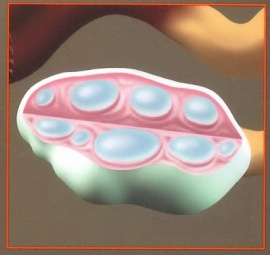2012-09-09
Polycystic ovary syndrome (PCOS).
Author: Shih Ya-ling, Counselor

Various symptoms of polycystic ovary syndrome (PCOS) include:
|
Irregular Menstruation:
|
If the hormonal balance between the ovaries and the pituitary gland is disrupted, abnormal ovulation or even the absence of ovulation (anovulation) can occur, leading to irregular menstruation. Sometimes the menstrual flow may be heavier than usual, while at other times there may be longer gaps between menstrual cycles (oligomenorrhea) or absence of menstruation (amenorrhea). Some women may experience pelvic pain, which could be attributed to hormonal effects on blood flow in the pelvic region. |
|
Skin Symptoms
|
The excessive release of the male hormone testosterone from the ovaries can result in high levels of testosterone in the bloodstream of women. This can contribute to the growth of acne on the face and back, and sometimes the development of facial, chest, arm, or leg hair. |
|
Fertility
|
Irregular ovulation implies difficulties in getting pregnant. Without ovulation, fertilization cannot occur. Therefore, women with irregular menstruation may have an increased chance of conceiving if their menstrual cycles become regular again. |
|
Miscarriage
|
Women with polycystic ovary syndrome (PCOS) are at a higher risk of miscarriage when the hormone progesterone (which supports pregnancy) is present in excessive amounts in the blood. Elevated levels of progesterone can hinder the growth of eggs in the follicles, making it difficult for the embryo to develop and implant in the uterus. |
Treatment options
|
Medication
|
The symptoms experienced by individuals with polycystic ovary syndrome (PCOS) can be improved through medication. Patients can also make lifestyle changes to help alleviate symptoms. |
|
Weight Management
|
Controlling weight and ensuring it is proportionate to height can help prevent complications. One method is to calculate your body mass index (BMI), which is calculated by dividing weight (in kilograms) by height (in meters) squared. A normal BMI falls between 20 and 25. |
|
Irregular Menstruation
|
Currently, most gynecologists prescribe low-dose contraceptive pills to women with PCOS. For those who are not suitable for contraceptive pills, progestin medications can be used. Typically, these medications are taken for 12 days every two to three months to induce menstruation. |
|
Assisted Reproductive Techniques
|
PCOS-related anovulation often leads to infertility. The following methods can assist in achieving pregnancy: a) use of ovulation-inducing drugs, b) artificial insemination, and c) in vitro fertilization (IVF). |
|
Laparoscopic Surgery
|
This involves using heat therapy to treat the ovaries, replacing the older "wedge resection" surgical technique that involved removing a portion of the ovarian tissue. The newer approach utilizes laparoscopic surgical equipment to heat-treat a portion of the ovarian tissue, correcting hormonal imbalances and promoting ovulation. |




